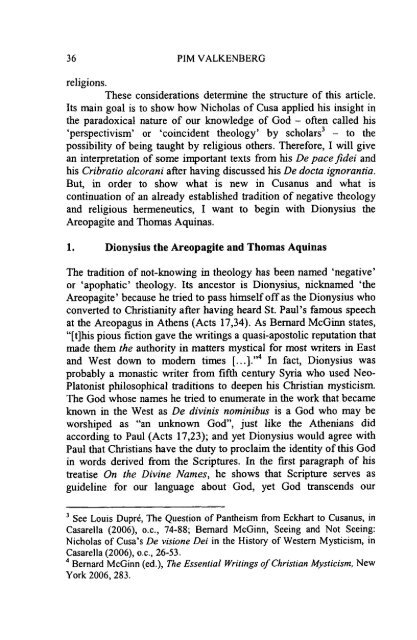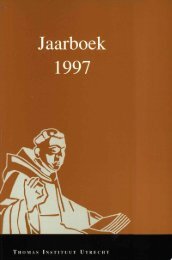Jaarboek Thomas Instituut 2006 - Thomas Instituut te Utrecht
Jaarboek Thomas Instituut 2006 - Thomas Instituut te Utrecht
Jaarboek Thomas Instituut 2006 - Thomas Instituut te Utrecht
You also want an ePaper? Increase the reach of your titles
YUMPU automatically turns print PDFs into web optimized ePapers that Google loves.
36 PIM VALKENBERG<br />
religions.<br />
These considerations de<strong>te</strong>rmine the structure of this article.<br />
Its main goal is to show how Nicholas of Cusa applied his insight in<br />
the paradoxical nature of our knowledge of God - of<strong>te</strong>n called his<br />
'perspectivism' or 'coincident theology' by scholars" - to the<br />
possibility of being taught by religious others. Therefore, I will give<br />
an in<strong>te</strong>rpretation of some important <strong>te</strong>xts from his De pace fidei and<br />
his Cribratio alcorani af<strong>te</strong>r having discussed his De docta ignorantia.<br />
But, in order to show what is new in Cusanus and what is<br />
continuation of an already established tradition of negative theology<br />
and religious hermeneutics, I want to begin with Dionysius the<br />
Areopagi<strong>te</strong> and <strong>Thomas</strong> Aquinas.<br />
1. Dionysius the Areopagi<strong>te</strong> and <strong>Thomas</strong> Aquinas<br />
The tradition of not-knowing in theology has been named 'negative'<br />
or 'apophatic' theology. Its ancestor is Dionysius, nicknamed 'the<br />
Areopagi<strong>te</strong>' because he tried to pass himself off as the Dionysius who<br />
conver<strong>te</strong>d to Christianity af<strong>te</strong>r having heard St. Paul's famous speech<br />
at the Areopagus in Athens (Acts 17,34). As Bernard McGinn sta<strong>te</strong>s,<br />
"[t]his pious fiction gave the writings a quasi-apostolic reputation that<br />
made them the authority in mat<strong>te</strong>rs mystical for most wri<strong>te</strong>rs in East<br />
and West down to modem times [... ].,,4 In fact, Dionysius was<br />
probably a monastic wri<strong>te</strong>r from fifth century Syria who used Neo<br />
Platonist philosophical traditions to deepen his Christian mysticism.<br />
The God whose names he tried to enumera<strong>te</strong> in the work that became<br />
known in the West as De divinis nominibus is a God who may be<br />
worshiped as "an unknown God", just like the Athenians did<br />
according to Paul (Acts 17,23); and yet Dionysius would agree with<br />
Paul that Christians have the duty to proclaim the identity of this God<br />
in words derived from the Scriptures. In the first paragraph of his<br />
treatise On the Divine Names, he shows that Scripture serves as<br />
guideline for our language about God, yet God transcends our<br />
3 See Louis Dupré, The Question of Pantheism from Eckhart to Cusanus, in<br />
Casarella (<strong>2006</strong>), o.c., 74-88; Bernard McGinn, Seeing and Not Seeing:<br />
Nicholas of Cusa's De visione Dei in the History of Wes<strong>te</strong>rn Mysticism, in<br />
Casarella (<strong>2006</strong>), o.c., 26-53.<br />
4 Bernard McGinn (ed.), The Essential Writings afChristian Mysticism, New<br />
York <strong>2006</strong>,283.








